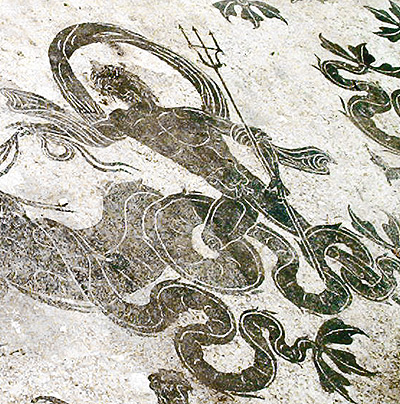Neptunus
Home | Latíné | Deutsch | Español | Français | Italiano | Magyar | Português | Română | Русский | English
⚜⚜⚜ Site Index - Key Pages ⚜⚜⚜
Neptunus (Neptune) is the Roman God of the sea and still waters. His name is derived from the Etruscan Nepthuns. His major festival is the Neptunalia, celebrated in Quintilis. For a time he was paired with Salacia, the goddess of the salt water. At an early date (899 BC) he was identified with Poseidon, when the Sibylline books ordered a lectisternium in his honour (Livy v. 13). In the earlier times it was the god Portunes or Fortunus who was thanked for naval victories, but Neptune supplanted him in this role by at least the first century BC when Sextus Pompeius called himself "son of Neptune". Neptune is associated as well with fresh water, as opposed to Oceanus, god of the world-ocean. Like Poseidon, Neptune was also worshipped by the Romans as a god of horses, under the name Neptune Equester, patron of horse-racing. The planet Neptune was named after the god, as its deep blue gas clouds gave early astronomers the impression of great oceans.
As god of the sea, it is likely that Neptunus was also connected to merchants and to trade generally. He is also found in the first lectisternium, mentioned with Mercurius, which also gives credence to this connection with trade and merchants.
Contents |
Festivals
Neptunalia
The Neptunalia is celebrated a.d. X Kal Sext. ‡. Very little is known about the celebrations that took place on this day, or about the cult which would have celebrated it. About the celebrations of the day, Fowler [1]
says that huts or booths of foliage were set up by the cultores, but this only to protect those who came to worship Neptunus on that day.
Its placement in mid-Summer suggests also the connection with trade, particularly trade by sea, from an astronomical view. In light of the fact that the Moon is at its farthest distance from Earth at this time, waves would have been significantly less than at other times of the year, which would be favourable to any sea-based trade. This would have been an optimal time to propitiate Neptunus in the hopes that he would continue to keep the waves minimised, allowing easier and more successful trade.
This also connects to agriculture. This festival is placed in enough time before the harvest to allow cultores to attempt to propitiate Neptunus such that, when the time comes, farmers will be able to harvest their crops successfully and use them at the markets to trade and barter. The favour of Neptunus would be essential to allow goods from other parts of the Mediterranean to reach Rome and all of Italy safely, something which the agricultural community of early Italy would have desired more than not.
Temples, Priests, and Cult
Just as there is little known about the Neptunalia, there is just as little known about his cult at Rome and throughout Italy. There is no known priest of Neptunus as sponsored by the State (as, for example, the Flamines).
- During the Empire, there is evidence of un flamen at Henchir-Ouradi near Bizacena (modern Tunisia), sacerdotes Neptuni in Numidia , amd a cultor all from Africa, a sacerdos Neptuni at Corinth, and magistri Neptunales at Delos.
In popular religion Neptune protected men and women from dangers from the sea and lakes. And prayed to for salus - life, welfare and incolumitas - safety. Yet as the god of moving and still waters, he was also worshiped on the inland of Italy as numerous examples of epigpraphy attest.
He was also called upon by farmers so the running waters, streams, rivers,would not dry out during the hot season of summer and by fishermen. His epithets were Pater -venerable, Adiutor - helper, Redux - who brings men back. He probably was also seen as a god who promoted vegetation, and during Imperial times, called upon for sea victories.
Neptune, unlike Greek Poseidon was never associated with horses, though his inland worshipers may have associated him with fruitfulness pythalmios and earthquakes.
Epigraphy
{{{2}}}: III 13400 (EN DE) Pannonia Superior: Neptuno et Nymphis pro Cassia Clementilla
References
- ↑ Fowler, W. W. The Roman Festivals of the Period of the Republic: An introduction to the study of the religion of the Romans (ISBN 1402148577)
2. Arnaldi, Ricerche Storico-Epigraphiche sul Culto di 'Neptunus' p. 224-5.
